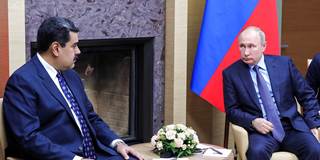Russia's enduring support for Nicolás Maduro, the Venezuelan president whose legitimacy is now being challenged, underscores the extent to which the Kremlin, buoyed by its success in Syria, is doubling down on its role as global disruptor-in-chief. But, unlike in Syria, Russia's resolve in Venezuela seems to be weakening.
MADRID – On January 23, National Assembly President Juan Guaidó swore himself in as Venezuela’s interim president before thousands of citizens, in an open challenge to the legitimacy of Venezuelan President Nicolás Maduro’s disastrous regime. The enduring political crisis – with the international community split over whom to recognize as Venezuela’s legitimate leader – has been revelatory.
Arguing that the May 2018 election that handed Maduro another term was a sham, Guaidó invoked a constitutional provision allowing the National Assembly president to take over for an absent or incapacitated president, while a new election is organized. Almost immediately, US President Donald Trump recognized Guaidó as Venezuela’s legitimate leader, a move that could hint at the emergence of an actual Trump Doctrine. Numerous Latin American countries and regional institutions followed suit, indicating a shift away from left-wing populism in the region.
As for the European Union, the response has been chaotic. Several members – including Germany, France, and the United Kingdom – eventually recognized Guaidó in a coordinated action. But others issued only statements of support, and Italy blocked a joint EU statement on the issue. This failed attempt to advance a unified policy has highlighted the dysfunction of the EU’s Common Foreign and Security Policy.

MADRID – On January 23, National Assembly President Juan Guaidó swore himself in as Venezuela’s interim president before thousands of citizens, in an open challenge to the legitimacy of Venezuelan President Nicolás Maduro’s disastrous regime. The enduring political crisis – with the international community split over whom to recognize as Venezuela’s legitimate leader – has been revelatory.
Arguing that the May 2018 election that handed Maduro another term was a sham, Guaidó invoked a constitutional provision allowing the National Assembly president to take over for an absent or incapacitated president, while a new election is organized. Almost immediately, US President Donald Trump recognized Guaidó as Venezuela’s legitimate leader, a move that could hint at the emergence of an actual Trump Doctrine. Numerous Latin American countries and regional institutions followed suit, indicating a shift away from left-wing populism in the region.
As for the European Union, the response has been chaotic. Several members – including Germany, France, and the United Kingdom – eventually recognized Guaidó in a coordinated action. But others issued only statements of support, and Italy blocked a joint EU statement on the issue. This failed attempt to advance a unified policy has highlighted the dysfunction of the EU’s Common Foreign and Security Policy.